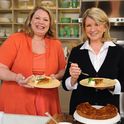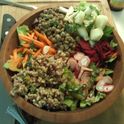What is the best ingredient for a MOIST cake? The cake is going to be vanilla. I've heard applesauce or diet coke?
20 Comments
NancyMay 18, 2017
I don't know if it's the best, but certainly one good ingredient is mashed potatoes. Already known for helping keep breads moist (see, for ex, James Beard recipe for refrigerator [rise] potato bread), some are using it for sweet cakes, especially for those who avoid gluten.
Lemon and orange cake recipe from BBC:
https://www.bbcgoodfood.com/recipes/1162651/lemon-and-orange-cake
Lemon and orange cake recipe from BBC:
https://www.bbcgoodfood.com/recipes/1162651/lemon-and-orange-cake
LynneD E.May 18, 2017
I've never tried adding mayo, or yogurt, but I will try on my next cake. Also, thank you all for youur ideas for a moister cake!
CinnaminFebruary 7, 2013
I have been adding warm milk to my basic vanilla cakes- I findvthat the warmer the milk,
the moister the crumb.
the moister the crumb.
AngelAnnJuly 2, 2012
Buttermilk always works for me. I usually substitute some of the milk with buttermilk.
zahavahJuly 2, 2012
Make a yogurt cake, for example: http://koshercamembert.wordpress.com/2012/06/26/once-upon-a-time/
meganvt01June 29, 2012
I just made Ina Garten's Beatty's Chocolate Cake and the main liquid was buttermilk - it was the moistest cake I have ever made so you may want to give that a try.
lorigoldsbyJune 29, 2012
cream of coconut (coco lopez) makes the cake VERY moist...so moist, it will "fall" in the center
Gibson2011June 29, 2012
One of my favorite chocolate cakes has pudding and mayo (in addition to a few eggs). It's even better the next day.
RaquelitaJune 28, 2012
I love yogurt in my cake--adds tenderness and I think it adds moisture--so if the recipe calls for milk i'll substitute yogurt.
OpheliaJune 27, 2012
You can add a Tablespoon of corn syrup or Hersey's Chocolate syrup (which is basically just chocolate flavored corn syrup), that always seems to make a difference for my cakes. Honey might work too, it's high in fructose as well. I'm not sure why this works, but it's always worked for me (added chocolate syrup to a depression cake about 5 years ago and was amazed by the difference, have experimented since).
Otherwise replace some of the butter with oil.
Or do what people used to do and moisten your cake with syrup (with or without spirits) or melted jam or jelly between the layers and before frosting.
Otherwise replace some of the butter with oil.
Or do what people used to do and moisten your cake with syrup (with or without spirits) or melted jam or jelly between the layers and before frosting.
lovesitcJune 27, 2012
Maybe I spent too much time living in the midwest, but we added a box of instant pudding to our cake batters to make them moist and delish.
Summer O.June 27, 2012
I find using vegetable oil makes a moist cake.
threefresheggsJune 27, 2012
N. 1 – don't over cook!
N. 2 – if, like me, the idea of using anything other than butter depresses you greatly, use extra! Extra butter will make a cake more dense, but if it is a rustic cake or low-flour, that won't matter. If you are looking for lightness & rise 50% more butter might be too much.
N. 2 – if, like me, the idea of using anything other than butter depresses you greatly, use extra! Extra butter will make a cake more dense, but if it is a rustic cake or low-flour, that won't matter. If you are looking for lightness & rise 50% more butter might be too much.
drbabsJune 27, 2012
Applesauce does make a cake moist, but also unpleasantly sticky. (When my daughter was in high school, we actually did an experiment for her science class that demonstrated this. ) I can't even imagine what diet coke will do, but I know that artificial sweeteners get bitter when heated. Shirley Corriher (Bakewise) says that oil makes cakes moist because it coats the proteins in the flour and prevents them from absorbing liquid in the batter and making gluten. So you could substitute some neutral oil for part of the butter in the recipe, or use a recipe that has oil as the fat instead of butter. Also, once you add the flour to the wet ingredients, don't over mix the batter. That will keep the cake from developing gluten and getting tough. I hope your cake turns out delicious.
AJFebruary 18, 2017
This is the BEST detailed response I've found. Breaking the science of it down makes it easier to understand and branch off from there. This makes cooking fun and adventurous! Thank you!
Showing 20 out of 20 Comments
Recommended by Food52
Popular on Food52
Continue After Advertisement










